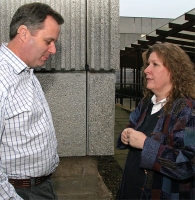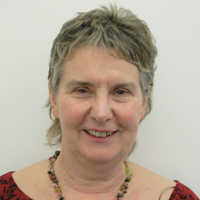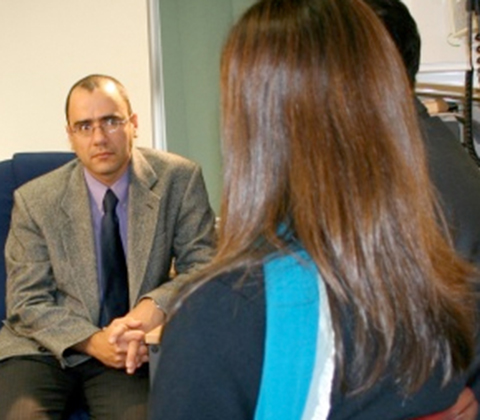Third Party Consultations course for GPs



This session considers the common situation of a family member interpreting for a patient in a consultation.
This session was reviewed by Khyati Bakhai and last updated in October 2021.
Learning objectives
By the end of this session you will be able to:
- discuss the potential problems and benefits of using family members to interpret
- describe ways of improving communication when a professional interpreter is not available
- describe how stress can compromise communication where shared language is limited, and how this can be addressed
The use of a trained professional is ethically preferable and will reduce mistranslation, with use of children being particularly inappropriate. However, family involvement might commonly be the only option where interpreting services are unavailable. There may also be patient or family preference for family interpretation, for example because of concerns about confidentiality. However, there is little research in this field to inform practice.

Before commencing this session you should:
- have an open mind
- have a desire to reflect on and enhance your practice
Joe Kai is Professor and Head of Primary Care at the University of Nottingham’s School of Graduate Medicine. He has been an inner city GP for 18 years, originally in Newcastle upon Tyne where he trained, and as part of the innovative general practice behind the West End Health Resource Centre in Benwell. He now practises in central Derby.
His health services research seeks to enhance care in ethnically diverse and disadvantaged contexts in a range of clinical areas, including applied genetics. He leads a national programme to support genetic assessment and screening, using haemoglobin disorders as a model (www.pegasus.nhs.uk). He currently leads the primary care programme of the NIHR Collaboration on Applied Health Research (CLAHRC) for Nottinghamshire, Derbyshire & Lincolnshire.
His books include Ethnicity, Health & Primary Care (OUP, 2004) and the BMA award winning Primary Care in Urban Disadvantaged Communities (Radcliffe, 2004). He has lead development of widely used educational resources to facilitate interactive health professional training. These include Valuing Diversity (2nd ed, RCGP, 2006), following its award winning first edition in 1999; and PROCEED: Professionals responding to cancer and diversity (Cancer Research UK, 2005) now adopted in national communication skills training for the NHS


Jackie Beavan qualified as a nurse in 1971 and was a hospital nurse until the mid-eighties. Since then, she has worked in education and training and has a special interest in communication, equality and diversity.
She has a BA in English, a BSc in Health Science and an MA in Linguistics. In 2002, she helped to update the second edition of ’Valuing Diversity’, an educational resource for GPs, commissioned by the RCGP and edited by Joe Kai. She was also involved in the research and development of ’PROCEED: Professionals responding to ethnic diversity and cancer’, an educational resource commissioned by Cancer Research UK, also edited by Joe Kai.
Jackie is based at the Interactive Studies Unit in the Department of Primary Care and General Practice at the University of Birmingham. Her main role there is to deliver courses in advanced communication skills to senior health professionals working in cancer care. She is also involved in delivering training in communication, equality and human rights for health professionals and medical students. Currently, she is working with Heart of Birmingham Primary Care Trust on a human rights pilot project in conjunction with the Department of Health and the British Institute of Human Rights.
Polly Wright is the Director of the arts in Health company HEARTH, which is a centre for health, eductaion and the humanities with art at the heart. The company has developed a national reputation for the use of the arts, drama and DVDs in mental and sexual health and was short listed for a national Media prize for their work in Norther Ireleand with the mental health Charity Rethink in 2007. Hearth is also responsible for setting up projects with mental health trusts to promote well being through reading.
www.thehearthcentre.org.uk
Polly is a teaching fellow in the Interactive Studies Unit in the Department of Primary Care in the Medical School of the University of Birmingham. She teaches communication skills at under-graduate and post graduate level, and is responsible for the development of arts and humanities in medicine in the under-graduate curriculum, specialising in creative writing and literature.
Polly has published articles on arts in health and is on the International Board at the new Arts and Health Journal - published by Routledge. She is regularly asked to present at conferences and seminars on Arts in Health.
Polly is also a professional actress, director and writer. She has published 5 well reviewed short stories and has written and produced over 10 plays. She was short listed for the Birmingham Poet Laureate in 2007.
Polly’s qualifications include:
- BA Hons in English Literature
- PGCE
- Advanced Post Grad Certificate in Drama
- Msc in Health Promotion

- Assessment course for GPs
- Posted By eIntegrity Healthcare e-Learning
- Posted Date: 2025-03-10
- Location:Online
- This session describes the main tools used to assess trainee GPs and distinguishes between formative...
- Self Appraisal course for GPs
- Posted By eIntegrity Healthcare e-Learning
- Posted Date: 2025-03-10
- Location:Online
- This session describes an approach to self-appraisal, and provides practical tips and guidance about...
- Telephone Consultations course for GPs
- Posted By eIntegrity Healthcare e-Learning
- Posted Date: 2025-03-10
- Location:Online
- This session explores the issues that may arise when a consultation is conducted over the telephone,...
- Difficult Consultations course for GPs
- Posted By eIntegrity Healthcare e-Learning
- Posted Date: 2025-03-10
- Location:Online
- This interactive session explores some of the difficulties associated with patients whose behaviour ...
- Balint's Ideas course for GPs
- Posted By eIntegrity Healthcare e-Learning
- Posted Date: 2025-03-10
- Location:Online
- This session introduces Michael Balint, outlines his principal ideas and describes his innovative us...






